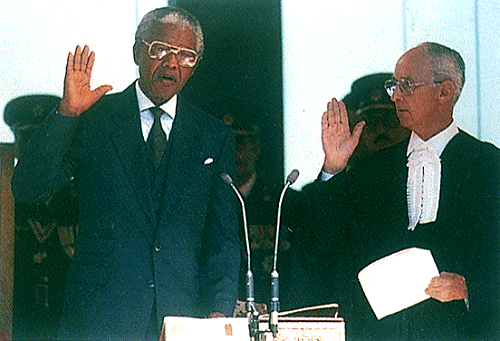Nelson Mandela Dead
December 6, 2013
Nelson Mandela, a key figure in ending apartheid in South Africa and the first black president of that country, died yesterday at age 95. Mandela had been in poor health for several years.
Mandela fought for many years to end the South African government’s policy of rigid racial segregation. Blacks make up about three-fourths of the nation’s population. But until 1994, South African law denied them the right to vote in national elections and to participate in the national government. In the first elections held in South Africa in which people of all races could vote, Mandela was elected president. He served from 1994 to 1999.

Nelson Mandela is sworn in as president of South Africa in May 1994. (© Mike Persson, Gamma Press)
Mandela was born in Umtata, capital of the Transkei territory (now in Eastern Cape province) in southeastern South Africa. His father was a chief of the Xhosa-speaking Tembu people. To pursue a career in law, Mandela gave up his right to succeed his father as chief. After earning a bachelor’s degree in 1943, he studied law at the University of the Witwatersrand. In 1952, he and another political activist, Oliver Tambo, opened the first black law partnership in South Africa. The men had been founding members in 1944 of the Youth League of the African National Congress (ANC).
The ANC party, founded in 1912, fought to gain political and civil rights for the country’s blacks and other nonwhites. The South African government outlawed the ANC in 1960. The ANC then began a policy of violent resistance to apartheid. In 1961, Mandela became the commander-in-chief of Umkhonto we Sizwe (Spear of the Nation), an organization that advocated armed struggle against apartheid. Mandela was arrested in 1962 and convicted in 1964 of sabotage and conspiracy. He was sentenced to life in prison. He spent the next 27 years as a political prisoner of South Africa. He slept on the floor of a cell that had no bed, performed hard labor in a rock quarry, and was permitted only one letter every six months.
During the time of Mandela’s imprisonment, people around the world became more aware of the injustice of South Africa’s apartheid system and of the plight of its political prisoners. Political activists from around the world circulated petitions calling for South Africa’s captives to be freed. Governments began sanctions against South Africa, refusing to sell the nation arms or to engage in trade with South Africa. Mandela’s wife at the time of his imprisonment, Winnie Madikizela-Mandela, also spoke out on his behalf.
Eventually, the pressure on the government of South Africa was too great, and in early 1990, Frederik Willem de Klerk lifted the ban on the African National Congress (ANC). On Feb. 11, 1990, Mandela was released from prison. He became president of the ANC in 1991, where he urged a policy of working with the white government of de Klerk during the transitional time at the end of apartheid rule. Mandela and de Klerk won a Nobel Peace Prize in 1993.
Mandela never planned on running for a second term as president. After his retirement from politics in 1999, he became an esteemed elder statesman and worked to promote social justice. He campaigned widely to increase awareness of AIDS.
Other World Book articles:
Other sites or videos of interest:


